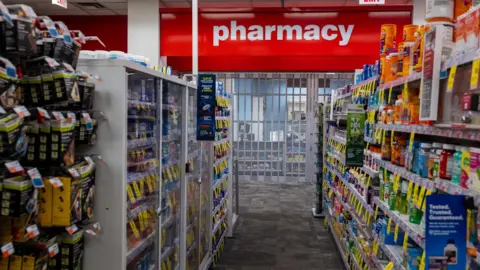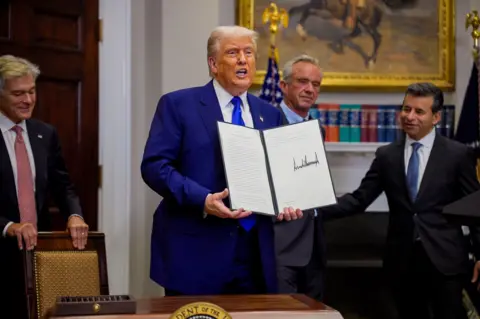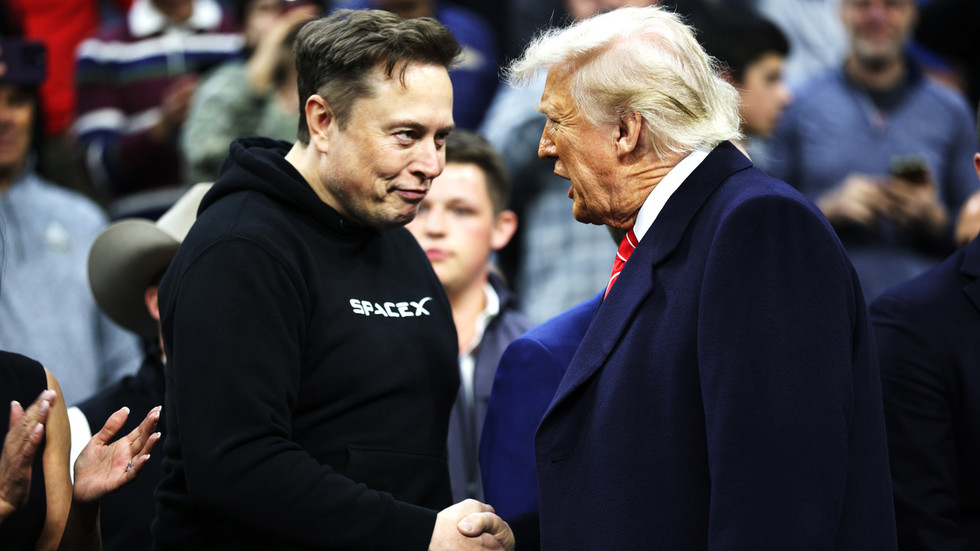Mike Wendling and Laura Blasey
BBC News
Watch: Trump to 'equalise' drug prices between the US and other countries
US President Donald Trump has signed an executive order that aims to reduce high prescription drug prices – but its details and long-term effects are far from clear.
Citing figures that patients in other countries pay much less than Americans for pharmaceuticals, Trump said he would order drug companies to reduce their prices inside the US.
He touted the move as "one of the most consequential" executive orders in US history, claiming prices would fall "almost immediately, by 30% to 80%".
But experts are highly sceptical of the claims, and stock market moves indicate that investors think they will have little immediate effect.
Why are American drug prices so high?
The US has a particularly complex healthcare system - including a large private insurance industry, employer subsides, and publicly funded insurance programmes for the elderly and poor, known as Medicare and Medicaid respectively.
In many other developed countries, more centralised systems mean that officials can negotiate blanket rates for drugs, and in some cases refuse to buy if they deem the price too high.
In 2021, the US Government Accounting Office made a comparison with Australia, Canada and France, and found that prescription drugs were on average two to four times more expensive in the US.
Politicians from both US political parties have taken aim at the costs. During Monday's White House announcement, Health Secretary Robert F Kennedy Jr noted that prices had been a preoccupation of Democrats and a main target in socialist Senator Bernie Sanders' presidential campaigns.
Both Trump in his first term and former President Joe Biden tried to tackle the issue, particularly the cost of life-saving drugs such as insulin, but US prices remain stubbornly high.
Speaking at the White House on Monday, Trump and his health officials blamed the lack of progress on pharmaceutical lobbying efforts and large donations to members of Congress.
"The drug lobby is the strongest lobby," Trump told reporters. "But starting today, the United States will no longer subsidise the health care of foreign countries, which is what we were doing."
It should also be noted that Trump's trade tariffs – which he has consistently used to threaten other countries - could increase costs even further. Trump has previously said he will tax drugs imported into the US.
What was in Trump's order?
Trump's order is much wider than previous efforts to bring down costs - however, many details are yet to be worked out.
The wording directs US officials to make sure that deals over drug costs made by foreign countries do not result in "unreasonable or discriminatory" price hikes for Americans.
But what exactly is covered by those terms is unclear – as is the question of what measures the White House would take if "unreasonable" practices are discovered.
The White House also wants drug companies to sell more products directly to consumers - cutting out insurance companies and pharmaceutical benefit managers - and look into importing drugs from foreign countries where they are sold at lower prices. That idea has previously hit stumbling blocks over safety and trade rules.
An official said that Monday's order was the start of negotiations between the US Department of Health and Human Services (HHS) and industry.

 Getty Images
Getty Images
High drug prices have been a long-running source of dissatisfaction with the US healthcare system
What is Most Favoured Nation status?
The order also proposed that the US be given Most Favoured Nation (MFN) status – meaning drug companies would be asked to match the lowest price for a drug abroad when selling to US consumers.
"Big pharma will either abide by this principle voluntarily or we'll use the power of the federal government to ensure that we are paying the same price as other countries," Trump told reporters.
It was unclear what mechanism the White House would use to punish drug companies that refuse to voluntarily comply.
Drug prices are very opaque, according to Alan Sager, a professor of health policy at Boston University. Drug manufacturers could easily argue that they were complying with the order by touting the price discounts that they already routinely provide on very high listed retail prices, he told the BBC.
"Will they act? Maybe. Will they claim they act? Sure," Prof Sager said.
"Whether this will signal a durable and meaningful cut in extraordinarily high US drug prices is very unclear," he said. "This is rhetoric, not reality."
How did markets react?
Trump's preview of the announcement hit share prices of major drug makers, such as Pfizer, Eli Lilly and the UK's GSK.
But they staged a quick recovery, rallying after the administration shared the scope of its plans – an indication that investors do not expect the moves to have a major impact.

 Getty Images
Getty Images
US President Donald Trump holds up his executive order as his health officials look on: (L-R) Medicare and Medicaid Administrator Mehmet Oz, Health Secretary Robert F Kennedy Jr and Food and Drug Administration Commissioner Martin Makary
What else could hinder Trump's plan?
To try to retain their profits in the US, drugs companies could simply pull out of other nations in which they are selling their products more cheaply, according to researchers Darius Lakdawalla and Dana Goldman at the University of Southern California.
The researchers also said that foreign governments routinely underestimated the true value of drugs to patients, and that "shifting to a European pricing model in the US would lead to shorter, less healthy lives for Americans".
Meanwhile, it is unclear how lower prescription drug prices would fit into Kennedy's "Make America Healthy Again" agenda. The health secretary has consistently emphasised diet and exercise as the key to improving Americans' health – and has criticised the proliferation of many pharmaceutical products, including vaccines and drugs to treat mental illness.
However, any potential reduction in drug prices is likely to be popular with Americans - as polls consistently show that high costs are a top concern when it comes to the US healthcare system.
C Michael White, a pharmacy professor at the University of Connecticut, said that the results of the Trump administration's actions on drug prices "will be minimal for many Americans" but that any attempts towards greater transparency and lower costs "are a positive step in the right direction".
But the order is expected to face challenges from the pharmaceutical industry in courts and Congress.
What does industry say?
Industry groups are largely opposed to the executive order and say it will be counterproductive – potentially choking off the supply of drugs and funds for research while doing little to quell high costs.
Stephen J Ubl, president of the Pharmaceutical Research and Manufacturers of America, said in a statement that "importing foreign prices from socialist countries would be a bad deal" for American patients.
John F Crowley, president of the Biotechnology Innovation Organization, called MFN status "a deeply flawed proposal that would devastate our nation's small- and mid-size biotech companies" by potentially choking off funding for research.
"Patients and families are not a bargaining chip in a trade war, but that's exactly how they are being treated – first through proposed tariffs on our nation's medicines, now with foreign reference pricing in the name of fairness."
But Alan Sager, the Boston University professor, was sceptical about the industry's arguments. He pointed out that the money used to research a drug was spent before any profits were made, and suggested that there might be other ways to fund research - such as large cash prizes for cures for specific diseases.
Prof Sager suggested that real action to drive down drug prices would depend on the president's attention span.
"Given the president's apparent public vacillation on many topics, it just isn't clear that he'll stay with this problem or that he'll be willing and able to act effectively," he said.
With reporting by Natalie Sherman in New York

 3 weeks ago
13
3 weeks ago
13










 English (US) ·
English (US) ·